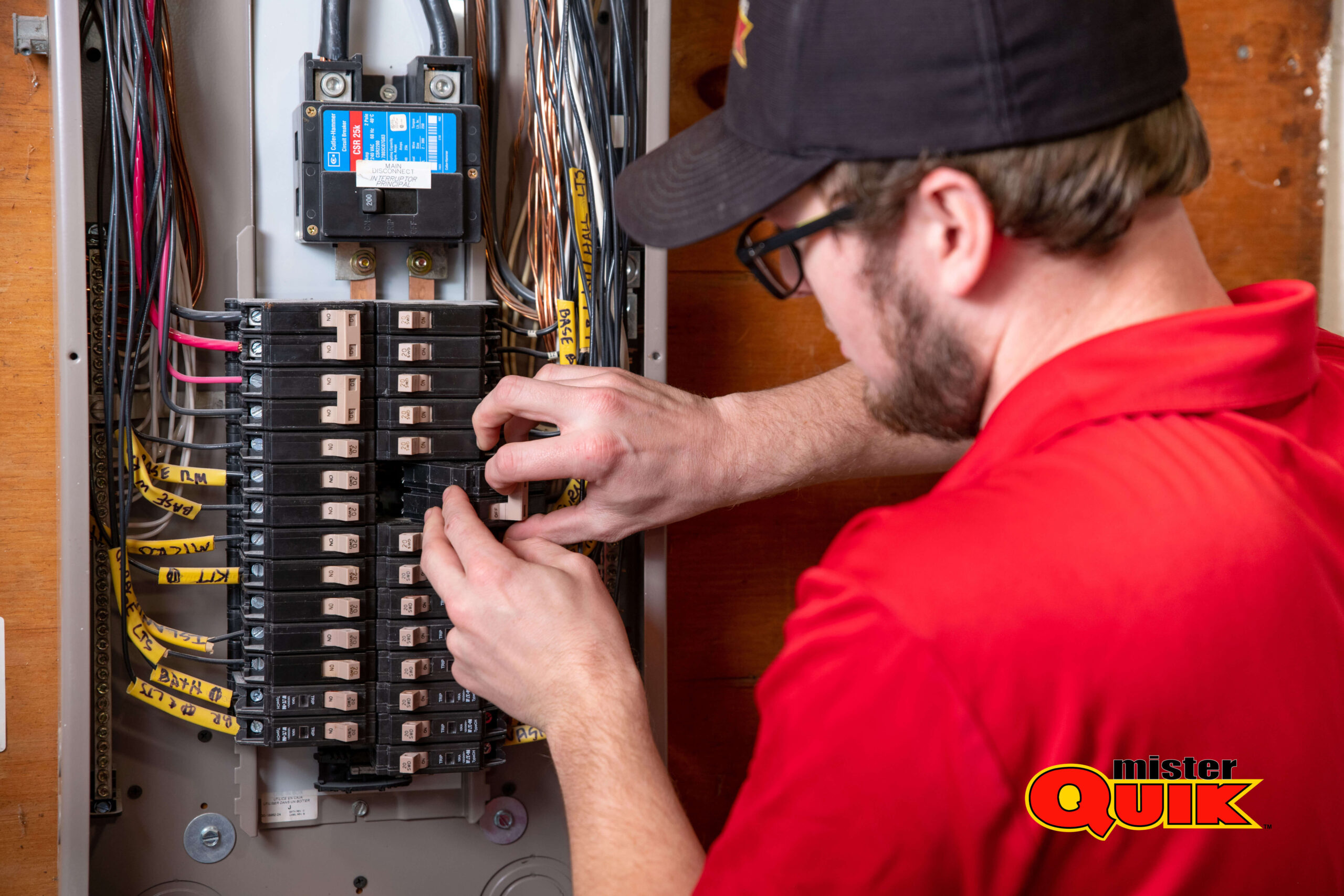Greenwood Electrical Service Panel
Schedule on your own without making a call. Click the button below to get started!

What is an electrical panel
An electrical panel, also known as a breaker box or fuse box, is a crucial component of your home’s electrical system. It serves as the central distribution point for electricity, regulating the flow of power to different circuits throughout your home. Understanding the purpose and function of an electrical panel is essential for ensuring the safety and efficiency of your electrical system.
- Distribution Hub: The electrical panel receives electricity from the utility company and distributes it to various circuits within your home, providing power to lights, outlets, appliances, and other electrical devices.
- Circuit Breakers or Fuses: Circuit breakers or fuses within the electrical panel act as safety devices, protecting your home from electrical overloads and short circuits by interrupting the flow of electricity when necessary.
- Main Disconnect: The main disconnect switch, typically located at the top of the electrical panel, allows you to shut off power to the entire home in case of emergencies or maintenance.
- Circuit Labels: Properly labeled circuits within the electrical panel make it easier to identify and troubleshoot electrical issues, ensuring safe and efficient operation of your electrical system.
- Capacity and Upgrades: The electrical panel’s capacity determines the maximum amount of electricity it can handle. Upgrading your electrical panel may be necessary to accommodate additional circuits or increased electrical demand due to home renovations or additions.
In conclusion, understanding the role of an electrical panel is essential for maintaining a safe and reliable electrical system in your home. Trust Mister Quik Home Services in Westfield to provide expert guidance and services for all your electrical panel needs, ensuring the safety and efficiency of your home’s electrical infrastructure.
Types of electrical panels
Are you curious about the different types of electrical panels used in homes? Understanding these panels is crucial for ensuring the safety and efficiency of your electrical system. Let’s explore the various types:
These panels have a built-in main circuit breaker that controls the power distribution to the branch circuits in your home.
Subpanels are additional panels installed to distribute power to specific areas or appliances in your home.
Older homes may have fuse boxes instead of circuit breaker panels. Fuse boxes contain fuses that serve as protective devices, interrupting the circuit when overloaded to prevent electrical fires.
These panels use circuit breakers to protect electrical circuits from overloads and short circuits.
The terms “breaker box” and “electrical panel” are often used interchangeably, but they generally refer to the same component in a residential or commercial electrical system. The electrical panel, also known as a breaker box or distribution board, is the main hub that controls and distributes electrical power throughout a building. It houses circuit breakers or fuses that protect individual circuits from overloads and short circuits. The primary difference is in the terminology: “breaker box” emphasizes the presence of circuit breakers, while “electrical panel” is a more generic term encompassing both circuit breakers and fuses, which were more common in older systems. In practical usage, both terms refer to the central point of electrical control and distribution in a structure.
The cost of a 200 amp service panel can vary depending on factors such as brand, features, and whether it includes installation. It’s advisable to obtain quotes from licensed electricians in your area to get a more accurate estimate based on your specific requirements and location.
Whether a breaker will fit your panel depends on several factors, including the specific make and model of your electrical panel, its compatibility with the breaker in terms of voltage and current ratings, and adherence to local electrical codes. Breakers are designed to be panel-specific, and using an incompatible breaker can pose serious safety risks and may violate electrical codes. It is crucial to consult the panel’s documentation or seek advice from a qualified electrician to ensure that any breaker you consider is compatible with your panel and meets all safety and regulatory requirements.
The most common electrical panel used in residential settings is the circuit breaker panel. Circuit breaker panels are designed to distribute electrical power throughout a home by dividing it into different circuits, each protected by a circuit breaker. These panels are safer and more convenient than older fuse boxes, as they allow for the easy reset of tripped circuits without the need to replace fuses. Circuit breaker panels typically have a main breaker that controls the entire electrical supply to the house and individual circuit breakers for various appliances, rooms, or areas within the home. They play a crucial role in ensuring electrical safety and managing the distribution of power efficiently.
Choosing the right electrical panel involves considering several key factors. Start by assessing your current and future electrical needs, factoring in the number of circuits required and the total electrical load. Ensure the panel has sufficient capacity to accommodate potential expansions. Select a panel from a reputable manufacturer that complies with local electrical codes and standards. Choose between main lug or main breaker panels based on your specific installation requirements. Additionally, consider the panel’s features, such as surge protection, ease of installation, and overall build quality. Consulting with a qualified electrician can provide valuable insights tailored to your specific situation, helping you make an informed decision on the most suitable electrical panel for your home or business.
Electrical panel installation
Are you considering electrical panel installation? Understanding the process is vital for ensuring a safe and efficient electrical system in your home. Here’s what you need to know:



- Assessment: A professional electrician will assess your current electrical system and determine if an upgrade or replacement is necessary based on factors like age, capacity, and safety concerns.
- Planning: The electrician will work with you to plan the installation, considering factors such as the size and type of panel needed, location, and any specific requirements or preferences you may have.
- Permitting: Depending on local regulations, permits may be required for the installation. Your electrician will handle the permitting process to ensure compliance with building codes and safety standards.
- Installation: The old panel will be safely disconnected, and the new panel will be installed according to manufacturer guidelines and industry best practices, including proper grounding and wiring connections.
- Testing and Inspection: After installation, the electrician will test the panel to ensure it functions correctly and safely.
Electrical panel installation is a critical aspect of maintaining a safe and reliable electrical system in your home. Trust Mister Quik Home Services in Westfield for expert installation services tailored to your specific needs.
Electrical panel upgrade
Are you considering upgrading your electrical panel? It’s a crucial step in ensuring the safety, reliability, and functionality of your home’s electrical system. Mister Quik Home Services in Westfield is here to guide you through the process:


Our expert electricians will assess your existing electrical panel to determine if an upgrade is necessary. Factors such as age, capacity, and safety concerns will be evaluated.


Upgrading your electrical panel allows for increased capacity to accommodate the power demands of modern appliances, electronics, and lighting fixtures.



Newer panels come equipped with advanced safety features such as arc fault circuit interrupters (AFCIs) and ground fault circuit interrupters (GFCIs) to reduce the risk of electrical hazards.



An upgraded electrical panel ensures that your home meets current electrical codes and regulations, providing peace of mind and avoiding potential issues during inspections or resale.
Cost to upgrade electrical panel to 200 amps
Are you considering upgrading your electrical panel to 200 amps? Understanding the costs involved is essential. Here’s what you need to know:
- Assessment: A professional electrician will assess your current electrical system to determine if it can support a 200-amp panel upgrade.
- Material Costs: The cost of materials, including the new panel, breakers, wiring, and other components, will impact the total cost.
- Labor Charges: Labor costs for installation can vary based on factors like the complexity of the job and local labor rates.
- Permit Fees: Depending on your location, you may need permits for the upgrade, which can add to the overall cost.
- Additional Upgrades: If your existing wiring or electrical components need upgrades to accommodate the new panel, it will increase the total cost.
Electrical panel inspection
Are you considering an electrical panel inspection? It’s a crucial step in ensuring the safety and functionality of your home’s electrical system. Mister Quik Home Services in Westfield offers comprehensive inspections to identify potential issues and ensure your peace of mind.
Our electricians will visually examine the electrical panel for any signs of damage, corrosion, or overheating, which could indicate underlying problems.
We'll test each circuit breaker to ensure they trip properly when overloaded, preventing electrical fires and protecting your home from damage.
Our inspection includes checking the grounding system to ensure it's functioning correctly, which is essential for protecting against electrical shocks.
We'll inspect the wiring within the panel to ensure it's properly connected and insulated, reducing the risk of short circuits and electrical hazards.
Our electricians will ensure that your electrical panel meets current building codes and safety standards, providing peace of mind and avoiding potential issues during inspections or resale.
In conclusion, scheduling an electrical panel inspection with Mister Quik Home Services in Westfield is a proactive step towards ensuring the safety and reliability of your home’s electrical system. Contact us today to schedule your inspection and safeguard your home against electrical hazards!
- Look for signs of damage, corrosion, or overheating in the electrical panel.
- Check for loose or burnt connections that may indicate underlying issues.
- Test each circuit breaker or fuse to ensure they trip properly when overloaded.
- Check for any breakers or fuses that do not reset or trip when necessary.
- Verify the functionality of the main disconnect switch for emergencies or maintenance.
- Ensure the switch shuts off power to the entire home when activated.
- Confirm that circuits are correctly labeled for easy identification and troubleshooting.
- Update or replace labels as needed to maintain clarity and accuracy.
- Evaluate the panel’s capacity to handle current and future electrical demands.
- Consider upgrading the panel if additional circuits or increased capacity are necessary for home renovations or additions









